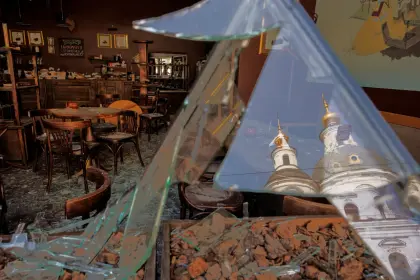In Kyiv and many other Ukrainian cities and towns, the savage latest Russian invasion has precipitated the removal of Russian and Soviet imperialist symbols.
Last month, in an interview with Ukrinform, Mykyta Poturaev, Chairman of the Verkhovna Rada Committee on Humanitarian and Information Policy, discussed the war’s impact on culture, calling for an overhaul of Ukraine’s cultural policy in response to what has occurred.
JOIN US ON TELEGRAM
Follow our coverage of the war on the @Kyivpost_official.
Considering the massive extent of pillaging, looting and destruction that has been a hallmark of Russia’s current invasion of Ukraine, and the Kremlin’s chauvinistic attempts to rewrite history, the main points the lawmaker made remain all the more valid.
Poturaev emphasized that the Russian army has caused massive damage to Ukraine’s cultural heritage, especially in Mariupol and elsewhere, where, according to him, “everything has been lost.”
“In the Kyiv region, Maria Prymaichenko’s museum has been destroyed. People risked their lives saving her paintings engulfed in flames. It’s a heroic act!” he said, adding that the Russians destroyed libraries, stole paintings by world-famous painters like Aivazovsky, burnt Ukrainian books, and musical instruments: “They are locusts, they destroy everything they see.”
Poturaev said that the Ukrainian minister of cultural and informational policy Oleksandr Tkachenko alongside other officials is working on a plan to restore the lost cultural objects. Yevheniya Kravchuk, Deputy Chair of the Committee on Humanitarian and Information Policy, was expected to travel to the Parliamentary Assembly of the Council of Europe to discuss the issue at the European level.
Commenting on the omnipresence of statues dedicated to Russian cultural figures in Ukraine, Poturaev says that they need to be removed, especially if they are irrelevant to Ukraine or Ukrainian culture: “We can discuss Russia’s contribution to the world culture. However, I agree with Ostap, [a Ukrainian YouTuber] that the statues located in towns and villages are there largely for imperialistic reasons.”
He also supports the removal of Russian literature from the curriculum, emphasizing that the percentage of works authored by Russian writers is disproportional. However, he believes that emotions must not eclipse reasoning, saying “I think we should leave books that are indeed part of the world cultural heritage and focus on humanism.” Others can be substituted with different authors from Japan, China, and India, among others.
Commenting on the cultural figures that Russia is attempting to privatize like Mykola Hohol, Mykhailo Bulgakov, Illya Repin, Kazimir Malevich, — all of whom were born in Ukraine – Poturaev notes that Ukraine must emphasize their origin both home and abroad while remaining honest.
“Bulgakov, a truly unique writer, was a Kyivan, but a Russian imperialist, opposing independent Ukraine. This circumstance, however, does not stop us from being proud of his works. Or take Ihor Sikorsky, the famous aviator. He was an avid imperialist too, yet we still respect him.”
The mayor of Kyiv, Vitali Klitschko, who on April 27 presided over the dismantling of a giant Soviet monument to “Russian-Ukrainian fraternity,” did not mince his words. “You don’t kill your brother. You don’t rape your sister. You don’t destroy your friend’s country. That’s why, today, we have dismantled this monument, once created as a sign of friendship between Ukraine and Russia,” he said.
Meanwhile, in Mariupol and other parts of southern and eastern Ukraine occupied by the Russians, the invaders are losing no time to restore or erect Soviet-era monuments, including statues of Lenin, and to impose the official use of Russian and even the ruble.
You can also highlight the text and press Ctrl + Enter



